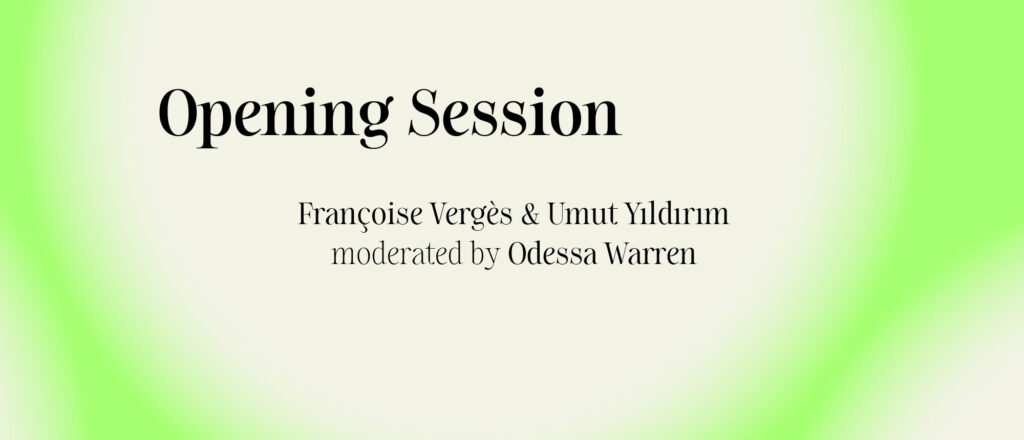
Share this:
Françoise Vergès & Umut Yıldırım
War-Torn Ecologies: Resistant Worlds
27/06/24 7pm
Free – £5.00
RSVP below for this in person event. By purchasing a ticket with donation, you directly support our programme.
How can we cultivate life amidst spirals of mass political violence? How do we forge methods and spaces of liberatory imagination? How do we practice, and love in the uninhabitable world of colonial and counterinsurgent violence, when escalating fascism and its genocidal mercenaries restlessly consume our breath?
Join us for the opening session where Françoise Vergès and Umut Yıldırım will contribute their thinking on these questions, followed by a conversation moderated by Odessa Warren.
This event is part of the multidisciplinary artistic programme War-Torn Ecologies: Resistant Worlds, taking place in London and Beirut. The project is inspired by the book War-Torn ecologies, Anarchic Fragments: Reflections from the Middle East (2023) by Umut Yıldırım. Extending from this, the programme focuses on the impact of perpetual colonial realities and counterinsurgency wars on ecologies in the Middle East. By engaging with artistic and ecological practices, it emphasises the relationship between human and more-than-human worlds as a methodology to counter ongoing colonial and imperialist systems of mass violence.
In a region often characterised by sectarian violence, “terrorism”, corruption, and resource exploitation, imaginative ecological practices continue to emerge through the cracks of occupation and war. Unfolding across multiple geographies, in physical and digital space, this programme brings together experimental and artistic practices which embody vital active solidarities. In turn, these create openings which resist and push back against the incapacitating effects of this violence.
About the speakers
Françoise Vergès is currently Senior Fellow Researcher, Sarah Parker Centre for the Study of Race and Racialization, UCL, London. Vergès receives her first political education from her anticolonial communist parents and the people in Réunion Island, an education she continued in Algeria, Mexico, England, UAE, USA, and France. A feminist anti-racist journalist and editor in the 1980s in France, she has also worked in menial jobs and as a curator and professor and has been active in many projects and in political movements. A co-founder of “Decolonize the Arts” (2015-2020), she is the curator of “L’Atelier”, a workshop with public performance with artists and activist (the more recent one was for Berlin Biennale, 2022) and co-directed the team that wrote the scientific and cultural program of a “post-museum” in Réunion Island. Her PhD (Berkeley University, 1995) Monsters and Revolutionaries: Colonial Family Romance and Métissage was published by Duke University Press in 1999. Interested in the racial fabrication of “premature death” and in the multiple practices of resistance, she writes books and articles on the afterlives of slavery and colonisation, climate catastrophe and racism, the impossible decolonisation of the western museum, decolonial feminism, psychiatry, the “post-museum.” Her books are translated in many languages. Her publications include: Program of Absolute Disorder. Decolonizing the Museum (Pluto, 2024), A Decolonial Feminism (Pluto, 2021); The Wombs of Women: Race, Capital, Feminism (Duke University Press, 2020), Aimé Césaire, Resolutely Black. Conversations with Françoise Vergès (Polity, 2020). She has written documentary films on Maryse Condé (2013) and Aimé Césaire (2011), and was a project advisor for documenta11 (2002) and the Triennale de Paris (2011).
Odessa Warren is a Lebanese-British curator and researcher from Cyprus. Her interests include critical ecologies, socially-engaged creative practices and the politics of South-South networks. She curated the first UK solo exhibition of artist Dala Nasser in 2022 entitled Time Spent Without its Flow. She is an incoming resident to the Art, Writing, Practice programme at Banff International Curatorial Institute in 2024. She has previously worked with Beirut Art Centre, The Palestinian Museum, Forensic Architecture, and the Palestinian Oral History Archive in Lebanon. She is currently Assistant Curator, International Art at Tate Modern where she works on transnational art histories.
Umut Yıldırım is an assistant professor of Anthropology at the Geneva Graduate Institute. Her research centers on war, extraction, and political and cultural mobilization with an ethnographic perspective from the Armenian-Kurdish region in Turkey. Her work is available in platforms including MERIP, Current Anthropology, and Anthropological Theory. She edited the book volume, War-Torn Ecologies, An-Archic Fragments: Reflections from the Middle East by ICI Berlin Press (2023). Previously, she held research fellowships in various academic institutions in the US and Germany; worked as an independent researcher in Palermo, Sicily; and taught political anthropology at several universities in Istanbul, Turkey. A manuscript for her first monograph, Low Intensities: War, Extraction, and Resistance in a Middle Eastern Capital, is in the works.
The programme War-Torn Ecologies: Resistant Worlds is supported by Art Jameel and British Council through Anhar: Culture and Climate Platform.
Design by Rand Hamdallah.